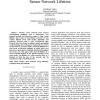20 search results - page 2 / 4 » E-MiLi: Energy-Minimizing Idle Listening in Wireless Network... |
GLOBECOM
2010
IEEE
13 years 2 months ago
2010
IEEE
Energy efficiency is one of the crucial design criteria for wireless sensor networks. Idle listening constitutes a major part of energy waste, and thus solutions such as duty cycli...
HPCC
2010
Springer
13 years 5 months ago
2010
Springer
This paper investigates the energy cost of control packets in schedule-based medium access control protocols in wireless sensor networks. Control packets can be useful not only to ...
HOTNETS
2010
12 years 11 months ago
2010
Conventional WiFi networks perform channel contention in time domain. This is known to be wasteful because the channel is forced to remain idle, while all contending nodes are bac...
JNW
2007
13 years 4 months ago
2007
— Wireless sensor networks must measure environmental conditions, such as temperature, over extended periods and therefore require a long system lifetime. The design of long life...
ICW
2005
IEEE
13 years 10 months ago
2005
IEEE
Most sensor network applications require quality of service guarantees on a network-wide basis, suggesting the need for global network cost optimization. The dynamic and nonunifor...

